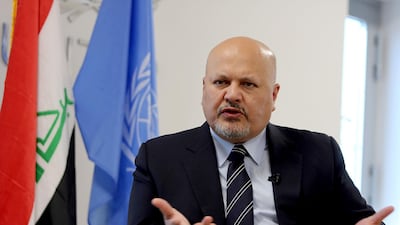The head of a UN team investigating ISIS crimes in Iraq has called for the extremists to face trials like those held at Nuremberg to try Nazis after the Second World War.
Karim Khan travelled around Iraq with a team of nearly 80 people to collect evidence that will be used in court to deliver justice for relatives of those killed by the terrorist group and to those who survived its atrocities.
The UN investigative body, known as Unitad, is analysing about 12,000 bodies from more than 200 mass graves, about 600,000 videos of crimes committed by ISIS and 15,000 pages from the group's bureaucracy.
“It’s a mountain to climb,” Mr Khan told Agence France-Presse at Unitad headquarters in Baghdad.
During the past year, Mr Khan’s team heard harrowing accounts of the killing of entire families and of women and girls being taken as slaves.
ISIS, which took over large areas of Iraq and Syria in 2014, declared a so-called caliphate and imposed a reign of terror that included public beheadings and the sexual enslavement of women from Iraq's Yazidi minority.
The terror group "wasn't some kind of guerrilla warfare or a mobile rebel group ... that's one aspect that is unusual" for international justice, Mr Khan said.
There was no "taboo" for ISIS, he said.
"Who could have thought in the 21st century we would see crucifixion or burning a human alive in a cage, slavery, sexual slavery, throwing people off buildings, beheadings?"
However, Mr Khan said that despite the horror the group inflicted, their crimes "were not new".
"What is new perhaps with ISIS, is that the ideology fuels the criminal group in the same way that fascism fuelled the criminal pogroms of Hitler," he said.
"Iraq and humanity requires its Nuremberg moment."
Nazi leaders were tried for the murder of nearly six million Jews during the Second World War before an international military tribunal at Nuremberg, Germany from 1945 to 1949.
Because of Nuremberg, "nobody could be taken seriously if they would espouse the principles of Mein Kampf", Mr Khan said, referring to Nazi leader Adolf Hitler's autobiographical manifesto. "In fact, alarm bells in the public conscience would be aroused if anybody thought the principles of fascism were an alternative political philosophy."
Nuremberg also "separated the poison of fascism from the German people", Mr Khan said.
"It was one of the principles of Nuremberg that there is no collective guilt", but individuals were held responsible, and condemned.
Mr Khan believes that just as Nuremberg was held as an example for Germany and Europe, ISIS trials "would have an educative effect, not only in the region, but in other parts of the world where communities may be vulnerable to the lies and propaganda of ISIS".
Iraq has already sentenced hundreds of its own citizens suspected of joining the terrorist group to death, whether they fought for ISIS or not.


